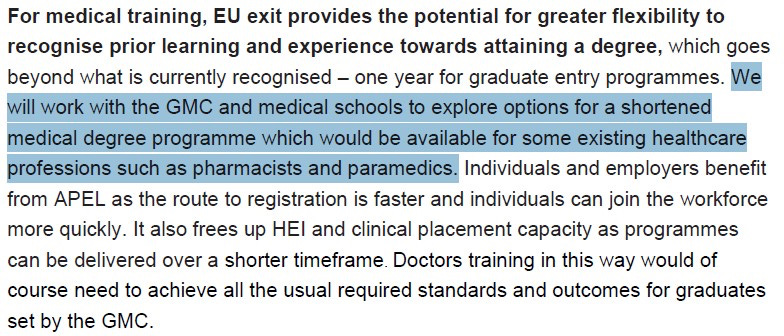I’ve just come back from the Hajj pilgrimage where Muslims all over the world gather to fulfil one of the core pillars of Islam.
As I battle the tiredness, jet lag and a viral infection, I “treated” myself to some “light reading” by reading through the NHS Long Term Workforce Plan.
151 pages later - I could completely appreciate what all the noise and controversy was about so I thought save you the read by summarising some of its contents.
What is the purpose of the document?
The forward by the current NHS CEO Amanda Pritchard is eye-opening. For the first time in a long time, the establishment comes clean about some of the serious challenges faced by the health service. Some of these issues include:
Poor distribution of staff - severe lack of staff in certain areas of the country and specialising in certain patient groups e.g. elderly and paediatric care.
Growing population numbers - the elderly population aged over 85 is expected to grow 55% by 2037
An exodus of doctors and nurses out of the UK
What is the proposed solution?
To tackle this, the NHS has suggested a three-pronged strategy. This is as follows:
TRAIN:
Double medical school places and nursing training places
Increase the number of GP training places by 50% by 2031/32
introduce a medical apprenticeship scheme
RETAIN:
Introduce more flexible working opportunities.
Provide increased funding for training and CPD.
REFORM
Expand nursing, physician and anaesthesia associates.
Bring physician and anaesthesia associates under GMC regulation.
Shorten medical school to 4 years.
Twitter has exploded since this report and there are some controversial propositions and statements. I’d like to explore some of these and it would be awesome if you could share some of your thought with us too?
There certainly is a staff shortage. The UK sits below the OECD average for the number of doctors as a proportion of the population. There is no mention of pay in all of this despite the ongoing strikes. Has the NHS (purposefully?) missed the elephant in the room?
A renewed need to grow the number of “senior decision-makers.” This has been controversial as traditionally it has been doctors who have assumed this role. However, provided that there is correct regulation, then it can be conceived that those other than doctors can assume such responsibility based on their experience, accreditation and seniority?!
Medical training will most definitely be reformed. There is talk of cutting it down to four years and introducing an apprenticeship. Aside from tradition, this is perfectly possible although it does (or should) mean a more intense undergraduate degree. All this is still quite vague as the report then suggests that this programme may only be available for existing professionals (nurses, pharmacists etc).
Medical school places will be expanded. Makes perfect sense. This is added to the fact that the government intends to open new medical schools in areas which need more clinicians. However, what if these graduates don’t actually wish to work in these areas?
The introduction of medical apprenticeships. This is quite controversial. Not entirely sure how this is going to play out as medicine is far from a vocational degree. However I’m not going to comment until the data/curriculum is released.
Expansion of an “allied health professional” workforce. There is a huge emphasis on increasing the training of advanced care practitioners, independent prescribers and physician associates. This is primarily under the banner of having “extended medical/surgical teams” to which the report dedicates a number of pages. Regulation under the GMC seeks to imbed PAs and AAs further into the medical team with the view to providing prescribing rights.
Final Thoughts
Above is a snapshot of what’s to come. There’s a lot more in the document which I haven’t commented on including international recruitment, specialist training positions and the future of independent radiographers.
Whilst I can appreciate some of the reaction around shortening the medical degree, apprenticeship schemes and widening the definition of “senior decision makers” I’m completely against some of the backlash against PAs, ACPs, AAs and independent prescribers.
Such staff bring a wealth of experience and are trained to their competencies. The fear that SOME clinicians have is that such professionals will “overstep” their boundaries and impinge on the training of others. There is no evidence for this. As professionals, we should respect the competencies of our fellow colleagues and seek consensus in areas of patient care. The multi-disciplinary team institutionalises this as we recognise the strengths and weakness’ of one and another and work together to provide world class care.
Please do share your thoughts about the NHS Long Term Workforce Plan.
It would be great to hear your reflections!
Until next time - Caio.
Check us out on our various pages
Website: www.paretoeducation.co.uk
Instagram: www.instagram.com/pareto_ed
Twitter: www.twitter.com/pareto_ed
Youtube: https://bit.ly/3DPm23c
Email: paretopaeducation@gmail.com





